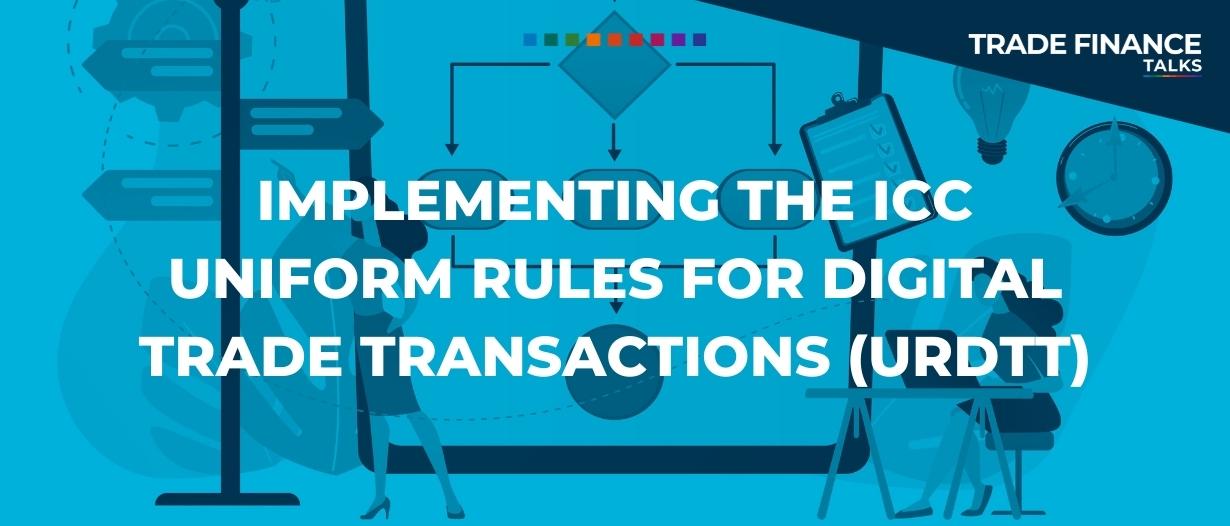This article was written by John Dunlop and Simona Racek.
The International Chamber of Commerce’s (ICC) uniform rules for digital trade transactions (URDTT) are the first universal rules for completing digital trade transactions online.
This article looks at the URDTT as it is applied to the first known commercial application: the eDTT Workspace.
“The ICC Uniform Rules for Digital Trade Transactions (URDTT) are intended:
- for a fully digital environment,
- to be neutral with regard to technology and messaging standards, and
- to extend into the corporate space, including commercial transactions and the growing community of non-bank providers of financial services.”
Overview
This discussion deals with three new concepts in the URDTT:
- the digital trade transaction (DTT),
- the payment obligation (PO), and
- the financial services provider payment undertaking (FSPPU).
The URDTT only stipulates the elements to be included in each of these electronic documents; it is neutral as to the technology or electronic format applied.
The eDTT Workspace application uses a cloud-based platform, interactive document templates, and Category 7 SWIFT messaging format as the vehicle for commercial application of these concepts.
The following sections will walk through each of the three new concepts, beginning with a definition and some of the key conditions followed by an example of a commercial application.

1. Digital trade transactions (DTT)
As defined in the URDTT, a digital trade transaction is an underlying transaction.
It is a process by which the terms of the commercial contract between the buyer and the seller are recorded and progressed to evidence the underlying sale and purchase of goods or services.
Digital trade transactions adhere to some key conditions. They are:
- Subject to URDTT Version 1.0
- An agreement to use electronic records evidencing the underlying sale and purchase of the goods (or services) and the incurring of a payment obligation by the buyer
- A specification of the terms and conditions by which compliance with an electronic record will be determined
- An agreement on the actual electronic records to be submitted, by whom they are to be issued, their data content, and the time frame in which they are to be submitted
- An agreement that the terms and conditions of the DTT will be incorporated, by reference or otherwise, in the buyer’s payment obligation
- A confirmation of the required capability of the required data processing systems
- An agreement on the required acceptable format for electronic records
- A confirmation that the seller can submit any required electronic records
- An agreement on any required authentication, if any, for specific electronic records
- An agreement on any required modification or exclusion to the URDTT
- A clarification as to whether the partial submission of electronic records is permissible
- An agreement, if required, as to the designation of a forum for dispute resolution
- An agreement, if required, to any specific addresses
- An agreement to the applicable law
Commercial application of the DTT into a digital trade payment (DTP)
The eDTT Workspace defines the URDTT digital trade transaction as a digital trade payment (DTP).
The digital trade payment puts the required elements into a Standard Category 7 SWIFT MT 700 message format, which is universally known as the documentary credit format.
In addition to the format’s worldwide familiarity, it is managed under the guidelines of the Uniform Customs and Practice for Documentary Credits (UCP 600).
Buyers, sellers, freight forwarders, banks, and service providers have used the UCP for over 85 years and should be able to transition from paper to digital without difficulty.
2. URDTT payment obligation (PO)
As defined in the URDTT Article 12, a payment obligation means an irrevocable obligation, incurred by a buyer, that constitutes a definite undertaking to effect payment at sight, or on a fixed or determinable future date, to the beneficiary.
The following list of elements are to be included in a payment obligation:
- A unique reference linking the payment obligation to the digital trade transaction
- The name and address of the principal parties and any other beneficiary
- The currency and amount
- If the amount is subject to payment of interest, this must be specified together with the basis on which interest is to be calculated and apportioned
- The date it is incurred
- The latest date for submission of electronic records
- The payment terms in accordance with the payment obligation and the electronic records themselves
- Whether the payment obligation is conditional or unconditional.
- If conditional, its conditions are to be as set out in the digital trade transaction
- The applicable law
- Whether it is transferable
Commercial application: payment obligation (PO) into a payment obligation buyer (POB)
The eDTT Workspace defines the URDTT payment obligation as a payment obligation buyer (POB).
The payment obligation buyer puts the required elements into an electronic document and is managed as a trade bill of exchange demand for payment after the conditions of the digital trade payment have been fulfilled.
Buyers, sellers, freight forwarders, banks, and service providers have used the bills of exchange over many years and should be able to transition from paper to digital concepts.

3. URDTT financial services provider payment undertaking (FSPPU)
As defined in the URDTT Article 13, a financial services provider payment undertaking constitutes the provision by a financial services provider of an irrevocable undertaking to effect payment, to the stated beneficiary within a payment obligation, at sight or on a fixed or determinable future date.
Elements to be included in a financial services provider payment undertaking are:
- A principal party or any other beneficiary makes a request to a financial services provider for an FSP payment undertaking to be added to a payment obligation. The financial services provider must agree to that request.
- The beneficiary must, at the time the FSP payment undertaking is added, inform the other principal party and any other beneficiary of the name and address of the financial services provider together with details of any limitation as to the liability of that financial services provider,
- Notify the amount of its FSP payment undertaking and, where the payment obligation specifies that it is transferable, whether the FSP payment undertaking can be transferred and, if so, any conditions that the financial services provider has imposed.
Commercial application: financial services provider payment undertaking (FSPPU) into a financial services provider payment undertaking financial (PUF)
The eDTT Workspace defines the URDTT financial services provider payment undertaking as a financial services provider payment undertaking financial (PUF).
The financial services provider payment undertaking financial is managed as a “confirmation” for the payment obligation buyer (POB).
Buyers, sellers, freight forwarders, banks, and service providers have used payment confirmation from banks for many years and should be able to transition from paper to digital concepts.
Summary
The URDTT is not a standalone set of rules that will by itself bring trade into the digital economy.
However, combined with video conferencing, document sharing, and the many evolving digital standards, it provides practical application for completing trade transactions online immediately.
The eDTT Workspace is operational and used for digital trade transactions today by SMEs at low cost, low complexity, and without the involvement of commercial banks.
Read the latest issue of Trade Finance Talks, June 2022






























